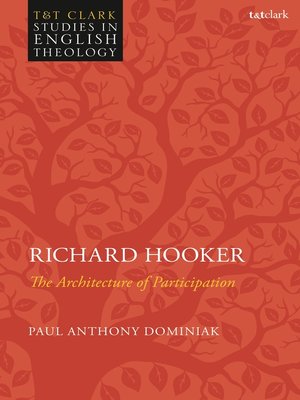Richard Hooker
ebook ∣ The Architecture of Participation · T&T Clark Studies in English Theology
By Paul Anthony Dominiak

Sign up to save your library
With an OverDrive account, you can save your favorite libraries for at-a-glance information about availability. Find out more about OverDrive accounts.
Find this title in Libby, the library reading app by OverDrive.



Search for a digital library with this title
Title found at these libraries:
| Library Name | Distance |
|---|---|
| Loading... |
Richard Hooker's Of the Laws of Ecclesiastical Polity has long been acknowledged as an influential philosophical, theological and literary text. While scholars have commonly noted the presence of participatory language in selected passages of Hooker's Laws, Paul Anthony Dominiak is the first to trace how participation lends a sense of system and coherency across the whole work.
Dominiak analyses how Hooker uses an architectural framework of 'participation in God' to build a cohesive vision of the Elizabethan Church as the most fitting way to reconcile and lead English believers to the shared participation of God. First exploring Hooker's metaphysical architecture of participation in his accounts of law and the sacraments, Dominiak then traces how this architecture structures cognitive participation in God, as well as Hooker's political vision of the Church and Commonwealth. The volume culminates with a summary of how Hooker provides a salutary resource for modern ecumenical dialogue and contemporary political retrievals of participation.
Dominiak analyses how Hooker uses an architectural framework of 'participation in God' to build a cohesive vision of the Elizabethan Church as the most fitting way to reconcile and lead English believers to the shared participation of God. First exploring Hooker's metaphysical architecture of participation in his accounts of law and the sacraments, Dominiak then traces how this architecture structures cognitive participation in God, as well as Hooker's political vision of the Church and Commonwealth. The volume culminates with a summary of how Hooker provides a salutary resource for modern ecumenical dialogue and contemporary political retrievals of participation.







